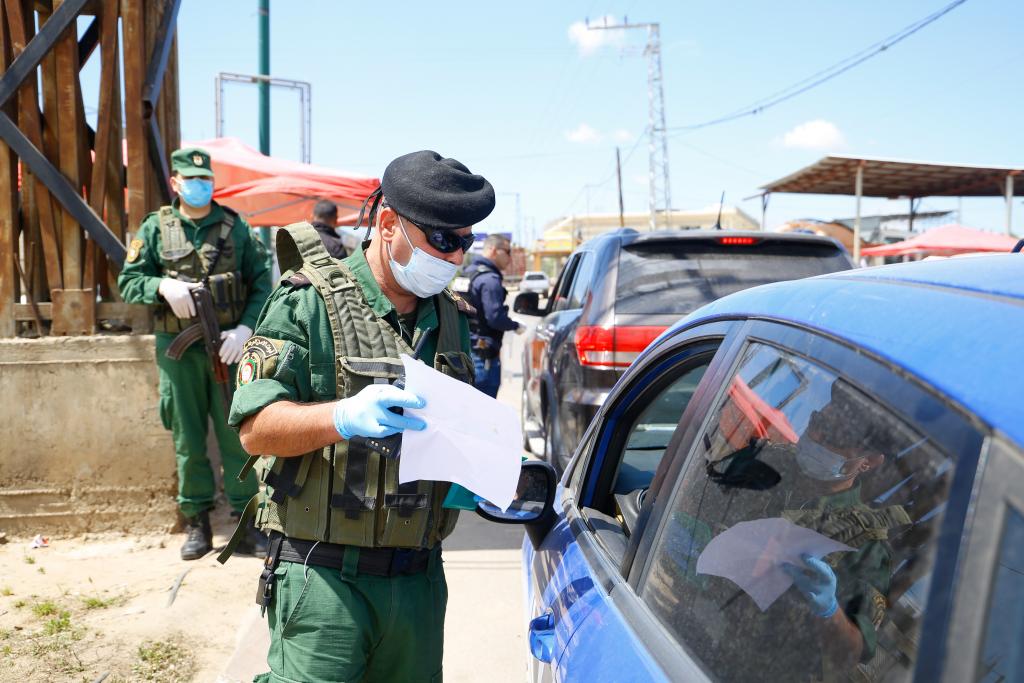In his contribution to the Democracy Centre’s commentary series on democratic experiences in the coronavirus pandemic, Riccardo Bocco, Professor of Anthropology and Sociology and Faculty Affiliate of the Albert Hirschman Centre on Democracy, explores how the pandemic sharpens discriminations in Palestine and how it impacts geopolitical strategies and capacities. Professor Bocco argues that it indirectly legitimizes the existence of one State and that it induces, de facto, a one-state reality, further jeopardizing the creation of an independent Palestinian State.
During this COVID-19 pandemic, one fact has clearly been established: the Israeli government has basically decided the health policies for everybody: in Israel, in East and West Jerusalem, in the West Bank and Gaza, through different ways.
In Gaza, the siege (already in place since 2007) has furthermore isolated the Strip’s residents, with the Hamas government enforcing strict quarantine measures for Gazans coming back from/through Egypt. The Strip continues to be highly dependent from the Israeli government’s goodwill to let enter medical equipment, while the local hospitals are ill-prepared to face the emergency.
In the West Bank, Palestinian residents of areas ‘A’ have not been allowed to travel across areas ‘B’ and ‘C’ because of the Israel Defense Forces (IDF) check-points and measures of confinement. The Palestinian Authority has enforced strict measures of confinement in Bethlehem when the coronavirus seemed to be spreading; so far, it has been successfully contained.
The East Jerusalem’s residents, as usual, fall in the cracks... The Palestinian Authority’s Ministry of Health is not allowed to operate in the Holy City. A number of initiatives to open emergency clinics have been rejected or limited, showing once more the differential treatment for the Palestinians.
In West Jerusalem the epidemic has seriously affected the Jewish Orthodox communities (who did not comply with the measures of confinement for religious reasons and/or lack of information), and the Netanyahu government has mobilized the IDF to contain the spread of the pandemic.
In Israel, so far, the Jewish population seems to have paid the highest toll, but the infections are mounting in the Palestinian rural areas and in the triangle (ex. Um al-Fahem). The discrimination towards the Arab citizens of Israel during the pandemic has lately become visible as well through their unequal treatment for compensations related to the COVID 19. While the Arab Israelis constitute more than 20% of Israel’s population, they were allotted only 2% of the funds disbursed by the State.
Overall, this means that we are facing a one-state reality: we should remove all “politically correct” language because Israel exerts sovereignty over all the territories it controls. And this has been an ongoing reality for a while: the unequal treatment and discrimination affecting the Palestinians is actually expanding. This clearly follows the implementation of the Jewish State’s new Organic Law promulgated during the summer 2018, which grants the right to self-determination only to Israeli Jews.
The connection with the Trump ‘Peace plan’ has to be made more explicit in light of the current context. We should take more seriously what the American administrations have been doing during the past decades to foster the dream of a ‘Greater Israel’. So far, Trump has successfully attempted to erase all what has been done/thought/hoped since Oslo. For him, international law is not an obstacle, pretty much like Netanyahu who considers Israel above international law...
The game is over: the Palestinians lost and they have to comply with the new rules dictated by the US and its Israeli ally. The US will continue to provide ‘exceptional’ humanitarian aid to the Palestinians, as far as they will not harbor State-building programs. Development projects for State-building will be frozen and opposed. For the Trump administration the ‘fake’ Palestinian State he proposed will be totally devoid of sovereignty... It also validates the 2018 Organic Law that considers the expansion of settlements in Judea and Samaria (i.e. the West Bank in the Israeli colonial taxonomy) a ‘patriotic endeavor’. In this context, the pandemic is fully playing in the hands of the settler colonial pursuit of interests, because the COVID-19 indirectly legitimizes the existence of One State.
What can we expect from the new Israeli coalition government for resuming peace talks? Not much, I think. Benny Gantz has agreed to pursue the objective of a ‘Greater Israel’. The annexation has been somehow ‘normalized’. The issue is a matter of calendar, modalities, time. Pending the ICC (International Criminal Court) decision to indict Israel’s and Hamas’ representatives for crimes of war, the Gantz-Netanyahu government will try to implement the annexation of all or part of the West Bank without calling it as such... for the sake of part of the international community’s reactions. However, the annexation will have serious juridical consequences and will help developing the de facto apartheid into a legal one. Actually, by extending its sovereignty, the Israeli administration will be applying discriminatory rules towards the Palestinian population residing in the West Bank. More than ever, the ‘only democracy’ in the Middle East, as most Israeli political leaders are used to describe the Jewish State, is in danger, and the ethno-nationalistic sentiments constantly fueled by the populist regime of Netanyahu will jeopardize the rule of Law.
Where is the international community? The Quartet is dead...thanks among others to Tony Blair. The Arab States pursue diverse interests and are partly busy with the consequences of the COVID 19 on their domestic policies. The UAE and Saudi Arabia have wasted a lot of money in the Yemen war to no avail. The Prince Mohammed bin Salman has become someway a doubtful ally for both the USA and Israel. Egypt and Jordan are heavily dependent on the American financial aid and they would hardly dare to openly oppose the Trump Plan. The EU is torn apart by its own internal divisions, and the Brexit is adding to it.
We can probably forecast a diminution of the EU aid to Palestine, as well as from its member States because they will have to deal with the economic effects of the pandemic. The EU stand, unless a miracle (always possible in the Holy Land!), will be probably quasi-irrelevant to refrain Netanyahu and his allies to implement their plan for the extension of Israel’s sovereignty over large parts of the West Bank.
Back in 2004, Mary Anderson was invited to Jerusalem by the Swiss Development Cooperation to discuss how her ‘do no harm’ approach could apply to the Palestinian context. She openly said that international aid was funding the occupation and at the same it was feeding a dependency path for Palestinian society and institutions. Has the situation changed in 2020? Not much, it seems… Nobody is comfortable about interrupting aid and putting Israel before its obligations as an occupying power (only the ICRC did it in 2002 during the Second Intifada, for the food aid it was distributing).
How can Switzerland make the difference? The Confederation has acquired a reputation over time for its constructive approach in conflictual contexts and for its support of international law and local human rights’ organizations. This stand seems to have been blurred during the past two years due to ambiguous messages from the Foreign Ministry of Foreign Affairs. It would be very important that Switzerland, depository of the Four Geneva Conventions (ratified by Israel as well), reaffirms its support for a two-state solution and to the funding of UNRWA, an agency that should be considered an instrument for peacebuilding in the present chaotic context. Notwithstanding the setbacks and disappointments of the last Commissioner-General, Pierre Krähenbühl, the new one is again a Swiss national and concerted plans with him and his staff should be developed.
Read also Prof. Bocco's interview in Les «vérités» de Benyamin Netanyahou, Le Temps, Luis Lema, 20 mai 2020.



